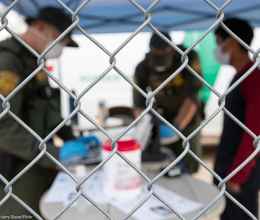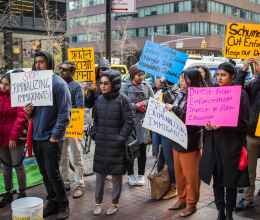By Ashoka Mukpo, ACLU Staff Reporter
When Flor got word that she was going to be able to make her way into the U.S. and reunite with her family last May, she was ecstatic. For more than nine months, Flor and her five-year-old daughter had been stuck in Matamoros, Mexico, living inside a two-person tent in a squalid refugee camp near the U.S. border while they waited for an immigration judge to hear their asylum claim.
Flor — whose full name is being omitted for her safety — and her daughter were among the roughly 60,000 asylum seekers who’d been trapped in Mexico under the Trump administration’s “Migrant Protection Protocols” (MPP).
The months she spent in Matamoros were a nightmare. Temperatures oscillated between blazing heat during the day and frigid cold at night. One of those nights, she and her daughter huddled in their tent as the sound of a gun battle between police and a local drug cartel echoed through the streets. Another time, Flor says men cornered her and demanded extortion payments. When she failed to pay, she was violently assaulted.
So when Flor heard that she and her daughter were going to be allowed to enter the U.S., the where they could continue the asylum process under the care of relatives in Massachusetts, she felt like she was being given a new lease on life.
“I don’t know how to express the happiness I felt,” she said. “Knowing that we would be happy, at ease, and safe…I don’t know if you could understand it.”
By May 2020, being allowed to enter the U.S. as an asylum seeker was akin to a miracle.
The Coronavirus pandemic was raging in the U.S., and hearings for cases like hers had been indefinitely postponed, stranding thousands of asylum seekers in cities across Mexico with no idea when immigration courts would start hearing their claims again. In March, the Centers for Disease Control had caved under pressure from the Trump administration and issued a dubious public health order that allowed border officials to eject asylum seekers from the country almost instantaneously. By late Spring, America’s asylum system had essentially ceased to exist.
But in Massachusetts, Flor’s family’s plea for help had reached the ACLU of Massachusetts. They were desperate – the stories she told them about the situation in the camp were increasingly dire, and they feared for her life and that of her young daughter. ACLU attorneys in the state and nationally had already brought litigation against the MPP, and they decided to take her case along with a coalition of other advocates.
Flor joined two other women — one of whom also had a five-year-old child — as plaintiffs in the case, which argued that putting them in the MPP was illegal and inhumane. In the following weeks, attorneys for the ACLU in Massachusetts interviewed Flor and the other two women via cell phone. Flor would charge hers ahead of time in a communal charging station at the camp.
“It was only after talking to them on the phone for a really long time, sometimes ten hours, that they felt comfortable enough to share some of the things that they had been through,” said Adriana Lafaille, a staff attorney with the ACLU of Massachusetts.
Flor is from Guatemala and is Maya K’iche’ — a member of an Indigenous group from the country’s remote highlands. Throughout Guatemalan history, Maya K’iche’ and other Indigenous groups have been the target of discrimination and violence at the hands of politically dominant Spanish-descended Guatemalans, sometimes called “Ladinos.”
In recent years, that violence has surged, with conflicts erupting between Mayan communities and prospectors with their eye on valuable mineral deposits beneath Indigenous land.
Flor’s father was a vocal advocate for Indigenous rights, and she says she suffered as a result. After he was attacked and incapacitated, she began working as a maid in a Ladino household at the age of 10. She suffered repeated abuse at the hands of her employers, and, at 19, was violently attacked by a group of men who demanded information about her uncles.
By mid-2019, she knew it was time to leave.
“I realized that my daughter and I would never be able to escape persecution in Guatemala, and we fled,” she recounted in an affidavit.
But by the time the COVID-19 crisis erupted, Flor had been in the Matamoros refugee camp for nearly eight months. Her daughter was losing weight, saying she was too sad to eat, and Flor feared the men who’d assaulted her might return.
In May, Flor received a phone call from her attorneys. A federal judge had ruled in her favor, granting the ACLU’s request for her to be taken out of the MPP. She and her daughter would be joining a small handful of people who’d escaped the policy.
Flor’s attorneys feared she might be sent to an immigration detention facility instead of being released to her family in Massachusetts. But after only a single night in detention, she and the others were released.
For Lafaille, it was a hard-fought win in an era where the courts have often thwarted efforts to block the Trump administration’s harsh immigration policies.
“We were all just so relieved,” she said. “For our clients, it was an end to this incredibly difficult ordeal and a long period of such hardship and uncertainty.”
Flor and her daughter settled into life in Massachusetts. The pandemic was still raging, so mostly they stayed inside, but occasionally she accompanied her aunt to the park or grocery store.
“It’s so peaceful here,” she said. “I feel a tranquility that I have never experienced in my life. I’m treated nicely by people.”
But it quickly became apparent that lawyers from the Department of Homeland Security were not going to accept the loss and move on. Not long after Flor and the others arrived in Massachusetts, Lafaille received notice that the government planned to appeal the decision.
By mid-summer, COVID-19 had arrived in shelters across the U.S.-Mexico border, as well as in the refugee camp where Flor spent nearly a year. Despite the rise in cases in Mexico, DHS refused to relent — the agency pressed on with the appeal, seeking the power to send Flor, her daughter, and the others back to Mexico immediately.
Lafaille says that the appeal is a symbol of just how hostile the federal government has become towards asylum seekers under the Trump administration.
“Not only has the government claimed that our clients weren’t facing urgent harms in Mexico,” she said. “But after our clients were here in Massachusetts, DHS also asserted that the appeal had to be expedited because it was the government that was being harmed by having to allow these three women and two children — who they never contended were dangerous in any way — to live in safety with their families.”
Because of DHS’s appeal, Flor isn’t just facing the daunting task of presenting an asylum claim in immigration court — she’s fighting to prevent her and her daughter from being forced to do so from a tent inside a refugee camp during a pandemic.
Flor says she has to find ways to distract herself from the prospect.
“I tell myself that I shouldn’t think about that,” she said. “When I do, I try to think about other things instead.”
The ACLU of Massachusetts argued against DHS’s appeal in front of the First Circuit Court of Appeals on Oct. 6. Even in an era where the federal government is using every avenue it can to prevent asylum seekers from entering the country, she says the appeal stands out.
“It just shows a government that is totally devoid of humanity,” said Lafaille. “In the government’s eyes, the MPP is working because it is so devastating to asylum seekers that many simply cannot make it to their hearings, and their claims are deemed abandoned. They want the process to be so hard and dangerous in Mexico that people just give up.”
Until the First Circuit rules on the appeal, Flor and the other new arrivals are stuck in limbo, hoping they’ll be allowed to remain safe and out of harm’s way.
“The thing I wish for the most, what I ask God for, is to not be sent back to Mexico,” she said.
The ACLU of Massachusetts is co-counseling this case with the firm Fish & Richardson. Flor has been represented in her immigration case by the Law Office of Jodi Goodwin in Harlingen, Texas, and is now represented by Greater Boston Legal Services and the Harvard Immigration and Refugee Clinic. In the First Circuit, the plaintiffs’ position was supported by National Citizenship and Immigration Services Council 119, represented by Patterson Belknap Webb & Tyler LLP; former government officials including Janet Napolitano, Roberta Jacobson and James Clapper, represented by WilmerHale; and a coalition of legal service providers and organizations, represented by the Law Office of Joshua M. Daniels.





